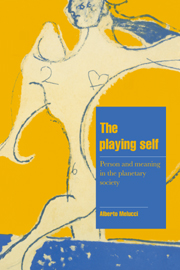Book contents
- Frontmatter
- Contents
- Introduction
- 1 The challenge of the everyday
- 2 Needs, identity, normality
- 3 Metamorphosis of the multiple self
- 4 The inner planet
- 5 Body as limit, body as message
- 6 On taking care
- 7 The abyss of difference
- 8 Amorous senses
- 9 Inhabiting the earth
- 10 A eulogy to wonder
- Epilogue
- Bibliographical note
- References
- Index
8 - Amorous senses
Published online by Cambridge University Press: 04 October 2009
- Frontmatter
- Contents
- Introduction
- 1 The challenge of the everyday
- 2 Needs, identity, normality
- 3 Metamorphosis of the multiple self
- 4 The inner planet
- 5 Body as limit, body as message
- 6 On taking care
- 7 The abyss of difference
- 8 Amorous senses
- 9 Inhabiting the earth
- 10 A eulogy to wonder
- Epilogue
- Bibliographical note
- References
- Index
Summary
Loving and reproducing
Sexuality without reproduction and reproduction without sexuality combined bring to the fore the radically contingent nature of love relationships and reveal otherness as the immutable condition of ‘being with’. The societies in which we live increasingly intervene in their own reproduction. First and foremost the biological basis of human behaviour becomes a target for social intervention and manipulation, with human reproduction itself emerging as a prime object of such interference. Consequentially, reproduction ceases to be a destiny and is finally transformed into a field of decision, action, and choice. But whose choice? Of individuals responsible for their own existence and thus presumably capable of deciding, or at least deciding whether to decide? Or of scientific, medical, and social apparatuses which fix the codes of behaviour, the canons of normality and of pathology?
The fact that reproduction is de facto no longer preordained introduces an aspect of a new and radical ambivalence into our cultural life. While the growth of information, medical progress, and changing morals and sexual customs offer men and women a new range of reproductive choices as well as responsibilities, the external control of their behaviour simultaneously increases. Such control is exercised not just through the manifest action of repressive apparatuses or authoritarian norms; it also operates through symbolic codes which govern our behavior and via the manipulation of the bio-psychological bases of human action.
In contemporary societies the reproduction of the human species has thus ceased to be a fact of nature.
- Type
- Chapter
- Information
- The Playing SelfPerson and Meaning in the Planetary Society, pp. 117 - 125Publisher: Cambridge University PressPrint publication year: 1996

